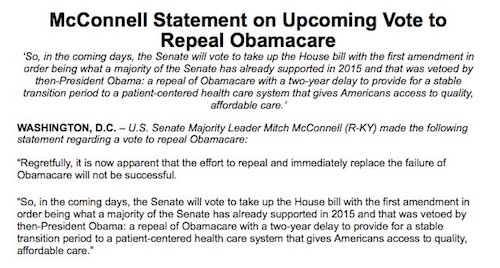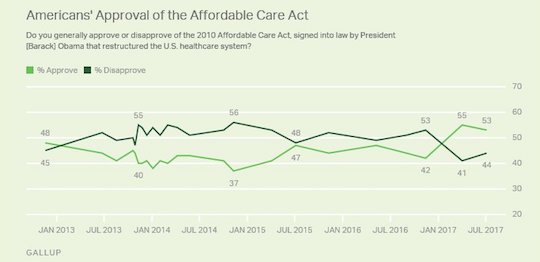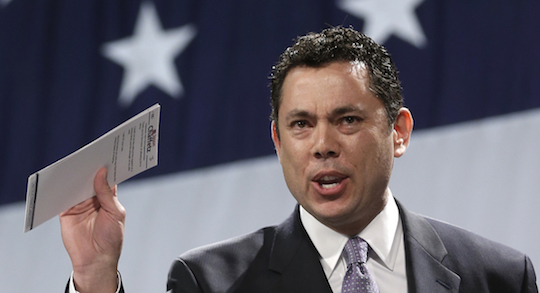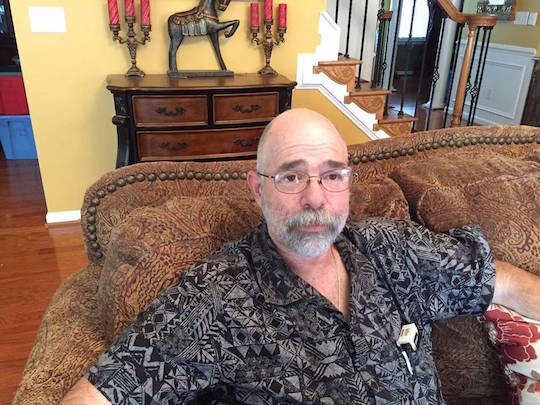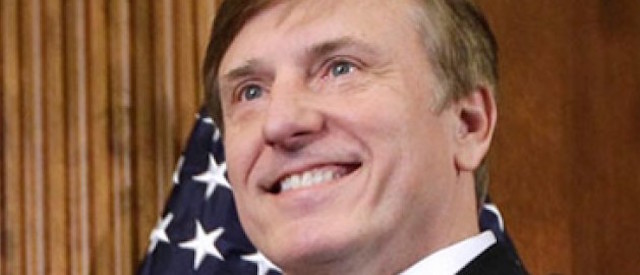Good news for freelancers with trick shoulders: Senate Majority Leader Mitchell “Mitch” McConnell has declared that there will be no vote on the Senate bill to replace Obamacare. This turn of events is a blow to the Republican agenda and, frankly, satisfying comeuppance after listening to them rail againast the Affordable Care Act for the last seven years. It is easy to find fault. It is not so easy to find workable solutions, as McConnell discovered over the past few weeks. He lamented the phenomenon in this statement, which also proposes a terrifying idea:
“Make sure to emphasize that Obamacare is the real failure,” he told his staffers. Also note the appearance of the word “immediately” in the established phrase “repeal and replace,” like a guest star who comes on in the last episode of a long-running drama to take the fall. So we failed to replace Obamacare immediately. We’re still going to replace it. What do you say we just repeal it now and replace it later?
Fortunately, the New York Times reports that plan dead on arrival. The same Republican senators who did not want to take health insurance from millions and give them savings accounts also did not want to take health insurance from millions and give them a timeline. For now, at least, the effort to repeal Obamacare has failed decisively—even though Republicans control both houses of Congress and the executive branch when “Watters’ World” isn’t on.
What does it all mean? I don’t think we can call this a triumph of Democratic opposition. Various operatives, particularly Andy Slavitt, have kept up a steady drumbeat against the Republican plan, but it’s hard to argue they stopped it. McConnell scratched his vote because a handful of Republican senators wouldn’t go along. They were the usual moderate naysayers: Murkowski and Collins, plus Shelly Moore Capito of West Virginia. Their persistent refusal could mean a few things:
- The GOP has drifted so far to the right on issues of social welfare as to lose the moderate members of its caucus.
- The bill under consideration was so particularly bad for women that these three women objected.
- Contemporary Republican politics is vigorous as a critique of liberalism but morbid as an approach to governance.
Guess which explanation I favor. The Republican lifestyle brand as we know it today was forged in opposition to Barack Obama. He was the smooth-talking biracial latte drinker atop the pyramid of liberal power, and they were the Real Americans who said no. Over the last nine years, the outlines of this coalition have become remarkably clear. You can guess whether someone votes Republican by their car, their facial hair, their music and TV habits, their religion—any number of cultural signifiers. This cultural coalition is the one that propelled Donald Trump to the White House, but it is not a coalition of political interests. Once you have to start making concrete policy choices, the Republican coalition falls apart.
How many interests do a West Virginia coal miner and a Chicagoland hedge fund manager have in common? What health care policy goals does Peter Thiel share with Ted Cruz’s dad? All four of these people are likely to agree on the issue of President Obama, but it’s harder to think of what else might bring them together. Right now, the GOP base consists of whites with high school diplomas, the investor/rentier class, evangelical Christians and libertarian idealists. A parliamentary system would put these demographics in at least three different parties. The contemporary Republican coalition has brought them all together, but it is not well suited to governance, because it is not an alignment of natural political interests.
It’s a great way to get a bunch of people all watching the same TV network or voting against the same lady. But it has yet to be fully tested as a machine for solving the country’s problems or even passing substantive legislation. After nine years of tenacious opposition, the need to cooperate may be what finally shakes the modern GOP apart.


